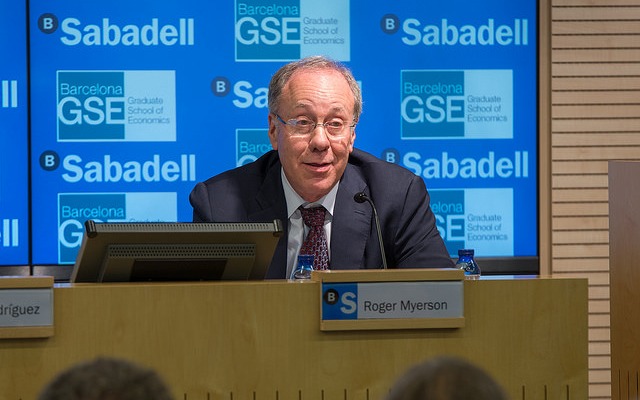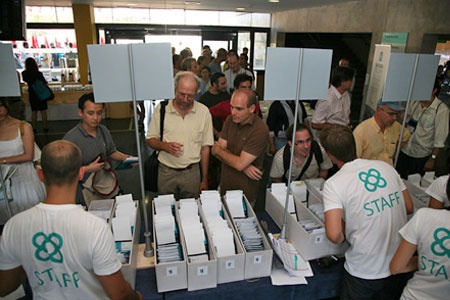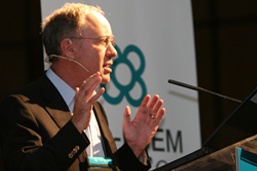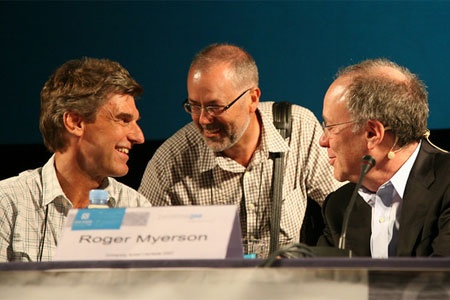community
Roger Myerson addresses EEA-ESEM at the GSE's Bellaterra Campus

On Sunday, August 23 nearly 1800 members of the European Economic Association (EEA) and the Econometrics Society (ES) converged on the BSE’s Bellaterra campus at the Universitat Autònoma de Barcelona (UAB) for the annual EEA-ESEM Congress. The Bellaterra campus will host the Congress though Tuesday evening, when it will move to the GSE’s Ciutadella campus at the Universitat Pompeu Fabra (UPF) for Wednesday and Thursday’s sessions.
Braving the summer temperatures, young researchers and renowned economists alike filled the sun-drenched walkways and terraces of the Bellaterra campus greeting old acquaintences and connecting with new colleagues. An unmistakable back-to-school feeling was in the air as participants pored over their program books, discussing which of the hundreds of presentations they planned to attend.
There is something for every economic interest with session topics including trade liberalization, contract theory, industrial organization, monetary policy, business cycles, environmental economics, and dozens more. Of note in the session programs are presentations by 21 BSE Affiliated Professors discussing topics such as labor markets and gender, education policy, wealth distribution and inequality, bounded rationality, and nonparametrics.
Featured on Monday evening was the Econometrics Society Presidential Address by Prof. Roger Myerson (University of Chicago, Nobel Laureate 2007) titled, “Understanding the Foundations of Institutions: Moral Hazard in High Office.” In this talk Prof. Myerson analyzed the complex relationship between leaders and the officials they place in charge of managing their interests.

Participants arriving at Bellaterra. In all nearly 1800 economists will attend the Congress this week.
Prof. Myerson highlighted a “scarcity of trust” as an issue at the heart of the relationship between leaders and officials, who will either act loyally, misbehave, or rebel depending on the incentives the leader offers for good behavior. He argued that this concept could be applied with equal relevance to large firms, governments, or other organizations of a similar scope.
During his presentation Prof. Myerson walked the audience through an econometric exercise that looked at this question from an analytical perspective (download presentation slides [pdf]).
In the conclusion of his address, Prof. Myerson discussed the moral hazard dilemna in relation to the current global crisis in banking and finance. He made the case that one could view senior-level bankers in modern society as a privileged elite like government leaders. In the case of banking, he argued that a scarcity of trust exists both between banking institutions and their mid-level bankers, as well as between institutions and their clients, who trust banks to invest their wealth responsibly.
“Moral hazard is an essential concern in a financial system that allocates vast amounts of other people’s wealth,” Prof. Myerson argued. “Before the 2008 crash I was writing that political leaders are like bankers, and now I want to say that bankers are like political leaders,” he said. “These people had opportunities to steer funds to cronies who kicked back money to them,” rather than directing the assets to the funds that best served the client’s investment interests.
“It has to be that senior bankers maintain a reputation for reliably rewarding good service,” Prof Myerson added. He suggested that this is why many American banks are continuing to pay bonuses to mid-level investors even after receiving government bailouts. The CEO must continue to pay out bonuses in order to reward mid-level bankers who did resist corruption, even though it may cause political problems.

In his presentation, Prof. Myerson argued that moral hazard is an essential concern in a financial system that allocates vast amounts of other people’s wealth.
“The [CEO’s] first order of business is keeping the depositors’ trust; the second order of business is to keep the intermediate managers’ trust,” meaning the guarantee of future rewards for good behavior, Prof. Myerson said. “Building and maintaining a reputation of trustworthiness at the individual firm level is essential to the health of political institutions and financial systems,” he added.
The EEA-ESEM 2009 continues on Tuesday at the Bellaterra campus. Tuesday’s program includes an institutional session featuring remarks by European Commission President José Manuel Barroso, Catalan Minister of Economy and Finance Antoni Castells, EEA President Prof. Lord Nicholas Stern, and GSE Chairman Andreu Mas-Colell. On Wednesday and Thursday the congress moves to the Ciutadella campus at the Universitat Pompeu Fabra (UPF).
Visit the EEA-ESEM 2009 Media Center for daily updates, photos, presentation downloads.

Torsten Persson, IIES (Stockholm University), Albert Carreras (UPF-GSE), and Roger Myerson (University of Chicago) chat before the ES Presidential Address.
